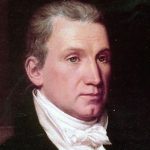Two of the worst of a bad bunch of English kings were a father and a son. John I was a son, however, of a Good King and a Good Thing – Henry II, who was more French than English anyway. John was the youngest of a rebellious bunch which included Richard I, Henry the Young King (who did not make it out of his teens) and Geoffrey, who died young but not before siring Prince Arthur of Brittany, later murdered.
John I was the favourite of his father Henry II, and mother, Eleanor of Aquitane. One wonders why. He was born in 1167, and became known as ‘Lackland’ because, unlike his older siblings, he did not receive properties from his Plantagenet father. This may well have rankled with young John, and accelerated his constant scheming.
Young John had to see his brother Richard, known as ‘Lionheart’ succeed when at last their father, tired out by decades of incessant family conflicts, troublemaking and wars, died in 1189. Henry had spent almost all his life in France, fighting and building castles. He spoke French as a first language. He did not like any of his sons, especially young Henry, who thought he would become Henry III, but didn’t.
When Richard the Lionheart was fatally injured by a crossbow sniper on the battlements of a castle at Gisors in 1199, it was brother Geoffrey’s son Arthur who should have become king. Sadly for the boy, he happened to be shut up in a castle in Rouen at the time, and Uncle John was in the same castle. Chroniclers say that John was drunk. He went to the cell where the teenage Arthur was imprisoned, and almost certainly strangled him with his own hands. He then tied the body to a large stone and threw it into the river Seine. The cadaver was later found by a local fisherman and recovered; the nuns of Nôtre-Dame-des-Prés gave it burial in secret because they feared John’s wrath. This charming incident happened on Easter Day. The Plantagenets already had a dubious reputation in England, and the murder of young Arthur did nothing to improve it.
During most of the reign of Philip II of France John had been intriguing with him, but now he became King of England. He was a passable lawyer, and started using his knowledge and skills to gather an immense fortune, mostly by stealing from the Church and the Barons.It is said that he exploited all means of extracting income. Among the crises of his reign was the loss of royal and baronial lands in Normandy, Anjou, Maine and Brittany between 1206 and 14. The king lacked land even more.
Later he refused to accept a churchman called Stephen Langton as his Archbishop of Canterbury. The Pope was infuriated by this refusal and John was excommunicated (then a very serious affair) and England placed under Papal Interdict. This was in effect the excommunication of the country as a whole, because Interdict meant no church services allowed except Confession and Holy Burial. No-one could go to Mass because the churches were closed.
John became even more unpopular, especially as popular street chants graphically described his method of dealing with his own nephew. The Interdict lasted from 1208 – 14.
The final crisis of John’s peculiar reign resulted from his Barons’ dissatisfaction with his disatrous and ruinously expensive financial policies and arbitrary style of government. They presented him with a formal statement of his obligations in the form of the Magna Carta in a meadow called Runnymeade in Berkshire. It was 1215. John signed the document, and almost immediately afterwards repudiated it with new measures, tithes and taxations that he had just invented. This caused the Barons’ War (q.v.) which only ended with John’s death in 1216.
Legends about Robin Locksley (Robin Hood), Sherwood Forest etc. began even while John I was still alive. He was a most unpopular king.
Henry III was the son of the hapless but dangerous John. He was born in 1207, and succeeded his father at nine years of age. During his minority England was ruled by a regent, William Marshal, Ist Earl of Pembroke, ‘assisted’ by Bishop of Winchester Peter des Roches, and Hubert de Burgh. The first-named was a great soldier and statesman, ruling England with authority and acumen.
Sadly, Henry announced that he was going to run things when he was nineteen, and quickly proved incompetent, but at least he was pious, rebuilding and reforming Westminster Abbey. He preferred foreign advisers, and soon got rid of the excellent Marshal. The king got an early warning of the Barons’ dislike of him when serious rebellion broke out under Marshal’s son Richard Earl of Pembroke. The uprising was put down with customary brutality.
One of Henry’s favourites was Simon de Montfort; never put your trust in favourites or princes, for in 1258 Simon de Montfort it was who led the English barons to draft a series of reforms called The Provisions of Oxford. Henry pretended to accept these new laws, but plotted to gain his independence from them, which led to civil war (1264 – 67). The former favourite won a victory at Lewes in 1264, gaining temporary control of England. Montfort’s success was brief. He was cut to pieces by Henry’s forces at the Battle of Evesham (1265).
Henry III reigned absently or badly from 1216 – 1272, but as his son Edward grew up, Henry became increasingly dependent on him, which was a Good Thing, because Edward III went on to become of the Best Kings of England. There are painfully few of them.










Leave A Comment